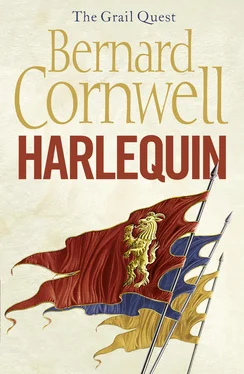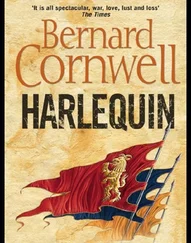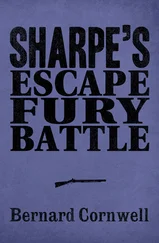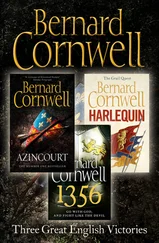He ran then as though the devil was on his heels. A crossbow bolt thumped into the turf as he came to Lipp Hill and two of the Genoese archers started to follow him, but Thomas was young and tall and strong and fast. He ran uphill through a pasture bright with cowslips and daisies, leaped a hurdle that blocked a gap in a hedge, then twisted right towards the hill’s crest. He went as far as the wood on the hill’s far side and there he dropped to catch his breath amidst a slope drifted with a haze of bluebells. He lay there, listening to the lambs in a nearby field. He waited, hearing nothing untoward. The crossbowmen had abandoned their pursuit.
Thomas lay in the bluebells for a long time, but at last he crept cautiously back to the hilltop from where he could see a straggle of old women and children scattering on the further hill. Those folk had somehow evaded the crossbowmen and would doubtless flee north to warn Sir Giles Marriott, but Thomas did not join them. Instead he worked his way down to a hazel copse where dog’s mercury bloomed and from where he could see his village dying.
Men were carrying plunder to the four strange boats that were grounded on the Hook’s shingle. The first thatch was being fired. Two dogs lay dead in the street beside a woman, quite naked, who was being held down while Frenchmen hitched up their mail shirts to take their turns with her. Thomas remembered how, not long ago, she had married a fisherman whose first wife had died in childbirth. She had been so coy and happy, but now, when she tried to crawl off the road, a Frenchman kicked her in the head, then bent with laughter. Thomas saw Jane, the girl he feared he had made pregnant, being dragged towards the boats and was ashamed that he felt a sense of relief that he would not have to confront his father with her news. More cottages were fired as Frenchmen hurled burning straw onto their thatch, and Thomas watched the smoke curl and thicken, then worked his way through the hazel saplings to a place where hawthorn blossom was thick, white and concealing. It was there he strung his bow.
It was the best bow he had ever made. It had been cut from a stave that had washed ashore from a ship that had foundered in the channel. A dozen staves had come to Hookton’s shingle on the south wind and Sir Giles Marriott’s huntsman reckoned they must have been Italian yew, for it was the most beautiful wood he had ever seen. Thomas had sold eleven of the tight-grained staves in Dorchester, but kept the best one. He’d carved it, steamed the ends to give them a slight bend against the wood’s grain, then painted the bow with a mix of soot and flax-seed oil. He had boiled the mix in his mother’s kitchen on days when his father was away, and Thomas’s father had never known what he was doing, though sometimes he would complain of the smell and Thomas’s mother would say she had been making a potion to poison the rats. The bow had had to be painted to stop it from drying out, for then the wood would become brittle and shatter under the stress of the taut string. The paint had dried a deep golden colour, just like the bows Thomas’s grandfather used to make in the Weald, but Thomas had wanted it to be darker and so he had rubbed more soot into the wood and smeared it with beeswax, and he’d gone on doing it for a fortnight until the bow was as black as the shaft of St George’s lance. He’d tipped the bow with two pieces of nocked horn to hold a cord that was made from woven hemp strands that had been soaked in hoof-glue, then he’d whipped the cord where the arrow would rest with still more hemp. He’d stolen coins from his father to buy arrow heads in Dorchester, then made the shafts from ash and goose feathers and on that Easter morning he had twenty-three of those good arrows in his bag.
Thomas strung the bow, took a white-fledged arrow from the bag, then looked at the three men beside the church. They were a long way off, but the black bow was as big a weapon as any ever made and the power in its yew belly was awesome. One of the men had a simple mail coat, another a plain black surcoat while the third had a red and green jacket over his mail shirt, and Thomas decided that the most gaudily dressed man must be the raid’s leader and so he should die.
Thomas’s left hand shook as he drew the bow. He was dry-mouthed, frightened. He knew he would shoot wild so he lowered his arm and released the cord’s tension. Remember, he told himself, remember everything you have ever been taught. An archer does not aim, he kills. It is all in the head, in the arms, in the eyes, and killing a man is no different from shooting a hind. Draw and loose, that was all, and that was why he had practised for over ten years so that the act of drawing and loosing was as natural as breathing and as fluent as water flowing from a spring. Look and loose, do not think. Draw the string and let God guide the arrow.
Smoke thickened above Hookton, and Thomas felt an immense anger surge like a black humour and he pushed his left hand forward and drew back with the right and he never took his eyes off the red and green coat. He drew till the cord was beside his right ear and then he loosed.
That was the first time Thomas of Hookton ever shot an arrow at a man and he knew it was good as soon as it leaped from the string, for the bow did not quiver. The arrow flew true and he watched it curve down, sinking from the hill to strike the green and red coat hard and deep. He let a second arrow fly, but the man in the mail coat dropped and scurried to the church porch while the third man picked up the lance and ran towards the beach where he was hidden by the smoke.
Thomas had twenty-one arrows left. One each for the holy trinity, he thought, and another for every year of his life, and that life was threatened, for a dozen crossbowmen were running towards the hill. He loosed a third arrow, then ran back through the hazels. He was suddenly exultant, filled with a sense of power and satisfaction. In that one instant, as the first arrow slid into the sky, he knew he wanted nothing more from life. He was an archer. Oxford could go to hell for all he cared, for Thomas had found his joy. He whooped with delight as he ran uphill. Crossbow bolts ripped through the hazel leaves and he noted that they made a deep, almost humming noise as they flew. Then he was over the hill’s crest where he ran west for a few yards before doubling back to the summit. He paused long enough to loose another arrow, then turned and ran again.
Thomas led the Genoese crossbowmen a dance of death–from hill to hedgerow, along paths he had known since childhood–and like fools they followed him because their pride would not let them admit that they were beaten. But beaten they were, and two died before a trumpet sounded from the beach, summoning the raiders to their boats. The Genoese turned away then, stopping only to fetch the weapon, pouches, mail and coat of one of their dead, but Thomas killed another of them as they stooped over the body and this time the survivors just ran from him.
Thomas followed them down to the smoke-palled village. He ran past the alehouse, which was an inferno, and so to the shingle where the four boats were being shoved into the sea-reach. The sailors pushed off with long oars, then pulled out to sea. They towed the best three Hookton boats and left the others burning. The village was also burning, its thatch whirling into the sky in sparks and smoke and flaming scraps. Thomas shot one last useless arrow from the beach and watched it plunge into the sea short of the escaping raiders, then he turned away and went back through the stinking, burning, bloody village to the church, which was the only building the raiders had not set alight. The four companions of his vigil were dead, but Father Ralph still lived. He was sitting with his back against the altar. The bottom of his gown was dark with fresh blood and his long face was unnaturally white.
Читать дальше












